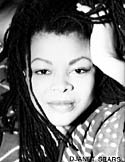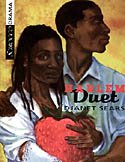 Djanet Sears has a problem with being first. As previews begin next week for a revival of her 1997 Governor-General's Award-winning play Harlem Duet, she officially becomes the first black playwright and the first black female director in the 54-year history of the Stratford Festival of Canada. The production will also be the first on any of its stages with an all-black cast.
Djanet Sears has a problem with being first. As previews begin next week for a revival of her 1997 Governor-General's Award-winning play Harlem Duet, she officially becomes the first black playwright and the first black female director in the 54-year history of the Stratford Festival of Canada. The production will also be the first on any of its stages with an all-black cast.When her follow-up play The Adventures of a Black Girl in Search of God was picked up by Mirvish Productions in 2003 for an extended run at Harbourfront Centre Theatre, Sears became the first black Canadian playwright to be featured on the playbill of this country's largest commercial producer.
Impressive, even if shockingly belated, achievements all, but the jury inside Sears's head is still out on what they mean in the long term. "Firsts are only great as the beginning of something," she explains in an interview in Toronto earlier this week. "If it's not, it's the only one." The racial-representation ratio in Canada's larger theatres is far from perfect, but there are some positive signs.
In 2005 Mirvish Productions followed up Adventures with a production of Trey Anthony's black-women confessional 'da Kink in My Hair, to date the most commercially successful single production of a Canadian play in the history of Toronto. At Stratford, there's a feeling that the end of Richard Monette's reign and changes in the festival's artistic directorship structure will bring about more culturally diverse programming.
"Things are changing, people are looking around and saying 'The world doesn't look like us here,' " Sears acknowledges.
The world of Harlem Duet certainly doesn't look like anything Stratford has created before even if one of its key players should feel at home in a festival with classical and Shakespeare credentials. The play is a modern reworking of Othello from an all-black perspective. Set over three time periods -- the 1860s, 1928 and the present -- Harlem Duet traces three relationships between Othello (Nigel Shawn Williams) and his black lover Billie (Karen Robinson), all of which end when he leaves her for an offstage white woman.
The play dwells the longest on the present in which Othello and Billie have already broken up but continue a sexual relationship that's both romantic and politically bifurcated. There are many debates in Harlem Duet but the central one examines integration versus separatism among the black community. Whether they embrace the colour of their skin (as Billie does) or refuse to be seen as just that (as Othello insists), "the burden of race" weighs as heavily on the characters in the play as it has for more than two decades of playwriting on their creator. I ask Sears if she's ever tired of carrying such a burden on behalf of a community as diverse as Canada's black population.
 "You're going to carry it anyway," she says. "When you hear that there have been three shootings, you go, 'Oh my god, I hope they are not black.' You identify with your race even when you don't know who these people are. You know it's going to have an effect on you, whether you like it or not. If you are going to have the burden, you might as well do something with it."
"You're going to carry it anyway," she says. "When you hear that there have been three shootings, you go, 'Oh my god, I hope they are not black.' You identify with your race even when you don't know who these people are. You know it's going to have an effect on you, whether you like it or not. If you are going to have the burden, you might as well do something with it."Rereading the original text of Harlem Duet was like downloading a soundtrack of the nineties' racial debates, from the phenomenon of The Bell Curve (a book that relates intelligence to race) to the O. J. Simpson trial. The latter case is particularly worth reprising. It may have been eclipsed by more devastating incidents (Katrina, for instance), but when the play opened in Toronto in 1997, the "Othello Syndrome" was still fresh.
"Jealous black men who are going to kill the white girl," Sears explains it in more straightforward terms. Yet, Harlem Duet doesn't attempt any kind of apology on behalf of Othello or Billie.
"The error that people often make is to think it's one-sided," says Sears. "I'm Billie and I'm Othello. That's the conflict. This is the effect of 400 years of white supremacy [and] what that has done to the psyche of black people."
Even if Sears has updated some of the references in the play to include Condoleezza Rice and Oprah Winfrey as the new faces of black America, Harlem Duet holds up, Sears suggests, because it asks questions and avoids answers.
"I find the questions still alive and real," says Sears. What's more disturbing perhaps is that these questions have passed on to another group in North America, its Arab and Muslim population, who collectively find themselves the latest addition to a long list of dangerous and suspicious racial others.
But any new meanings to Harlem Duet don't tone down or nullify its essential blackness. Harlem is more than a location backdrop for a postmodern twist on Othello.
"There's something about Harlem," Sears says. "I can't liken it to anything in the mainstream world. The place of Harlem Renaissance, the place of extraordinary poverty, of riots. . . . It feels like an axis, a central point, a hot spot."



No comments:
Post a Comment